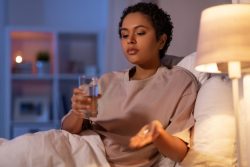Here’s Why Sleeping Pills and Sleep Apnea Don’t Mix
May 17, 2021
About 30 percent of adults report suffering from insomnia at some point in their lives, and millions of people also struggle with sleep apnea. Together, these two disorders create a “perfect storm” that makes it nearly impossible to get an adequate amount of rest. If you suffer from either of these conditions — or both — you might be tempted to use sleeping pills to fall asleep faster and perhaps even improve the quality of your sleep. However, that may not be wise. In many cases, sleeping pills can actually make sleep apnea in Melbourne worse. Let’s talk about why that is the case and what you may be able to do to sleep better without taking any medication.
How Sleeping Pills Affect Sleep Apnea
Most over-the-counter sleeping pills in Melbourne, including products like Tylenol PM, ZzzQuil, and generic brands, contain a type of antihistamine called diphenhydramine. Diphenhydramine works by blocking histamine receptors in the brain. Since those receptors play a role in wakefulness, interfering with their function induces a feeling of drowsiness.
That might sound appealing at first, but there is a major caveat. Diphenhydramine causes muscles throughout the body to relax, including the muscles in the throat that block the airway in sleep apnea sufferers. Because of this, you might experience more frequent and/or more severe pauses in breathing. Therefore, while sleeping pills might help you fall asleep faster, they can have a significant, adverse effect on the quality of your sleep.
Improve the Quality of Your Sleep without Medication
Since it is best to stay away from sleep aids that contain diphenhydramine, it is worth looking into other means that you can use to fall asleep faster and improve the quality of your sleep. Here are some tips:
- Stay in touch with your doctor. Your doctor can refer you to specialists, who in turn can diagnose sleep disorders and point you toward effective treatments. For example, you might benefit from oral appliance therapy to address sleep apnea.
- Try breathing exercises. Many people find that breathing exercises help them relax and are useful in the fight against insomnia.
- Get out of bed. This might seem counterintuitive, but when you cannot fall asleep, getting out of bed and doing something else until you feel drowsy can actually be really helpful.
- Make sure your bedroom is comfortable. Investing in a high-quality mattress and pillow, as well as making sure your bedroom is quiet and slightly on the cool side, can facilitate better sleep.
- Care for your mental health. If anxiety or other forms of emotional distress are contributing to your insomnia, a visit to a mental health professional might be in order.
Taking sleeping pills may seem appealing, but they are not generally recommended for people with sleep apnea. Finding other means to fall asleep and stay asleep may be a wiser course of action.
Meet the Sleep Apnea Expert
Dr. Kenneth Mogell is a dentist with decades of experience and a Diplomate of the American Board of Dental Sleep Medicine. He has completed extensive training in how to help patients conquer sleep apnea via oral appliance therapy. If you would like to speak with him about how you may be able to experience higher-quality rest, contact us via our website or call our Melbourne office at 321-313-5350.
